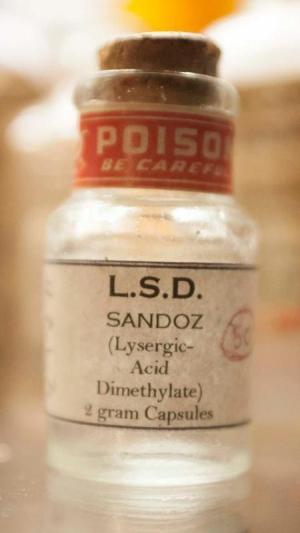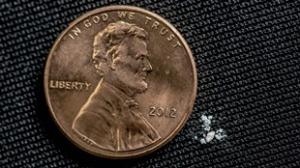It's way past time for human rights to be accorded its proper place in the formulation of international drug policy.
For the first time, rigorous science finds benefits in microdosing psychedelics.
Tune in to Facebook Live -- or come to our event if you're at the UN -- to learn about how Facebook and other media are being exploited by authoritarians in ways that are causing massive human rights violations, including in the drug war.
An Arizona Walmart worker wins a drug testing case, CBD bills are on the move, no edibles for North Dakota, and more.
A pair of New Jersey cops go rogue, prison guards go wild, and more.
Trump pushes his threat to close down the border into the future, migrant workers in the state-legal marijuana industry are being denied citizenship, New Hampshire is one step closer to marijuana legalization, and more.
A US territory legalizes weed, a US state decriminalizes it, Florida medical marijuana battles continue, and more.
Drug defelonization is advancing in Colorado, asset forfeiture reform heads to the governor in North Dakota, New Jersey bail reforms are having a dramatic impact, and more.
China bans all fentanyl variants, Sri Lanka is to resume drug executions, marijuana sentencing reform bills advance in Iowa and Texas, and more.
Trump pushes his threat to close down the border into the future, migrant workers in the state-legal marijuana industry are being denied citizenship, New Hampshire is one step closer to marijuana legalization, and more.
By its very nature, the global drug prohibition regime relies on the repressive apparatus of state actors to enforce compliance, and that has severe implications for human rights. Now, a coalition of United Nations member states, U.N. bodies, and leading human rights experts has launched a landmark set of international legal standards aimed at putting human rights concerns at the center of drug policy.

Drug execution in Iran, 2017. The Islamic Republic has greatly reduced the use of the death penalty for drugs. (handsoffcain)
The human rights implications of the global war on drugs cover a dizzying array of governmental abuses of their citizens. Whether it's the mass imprisonment of drug users in the US, the death squad-style atrocities of Philippines President Rodrigo Duterte's bloody anti-drug campaigns, the spraying of herbicides on coca-growing peasants in Colombia, forced drug treatment camps in Southeast Asia, or the resort to the death penalty for drug offenses in any number of countries, the quixotic global effort to eradicate drugs has left a trail of human rights abuses.
For years, human rights organizations such as Amnesty International and Human Rights Watch have championed the need to put human rights front and center when it comes to drug policy. But with the issuance this week of the International Guidelines on Human Rights and Drug Policy recognition of the necessary centrality of human rights moves from the sidelines to the very center of the global drug prohibition regime. Released under the aegis of the U.N. Development Program and the Joint U.N. Program on HIV/AIDS (UNAIDS) with the endorsement of key member states, the guidelines create a comprehensive set of human rights standards to guide governments in developing drug policies that comply with basic standards of universal human rights.
They also come at a key juncture in the global drug policy-formation process. The guidelines are being released as high-level governmental representatives are gathered at the Commission on Narcotic Drugs in Vienna to shape a new global drug strategy. With decades of evidence showing the systemic failures of the punitive paradigm, including widespread human rights violations, the U.N. and member states are facing a rising clamor for a shift in policy -- one that not only respects human rights but also places global drug policy in line with broader U.N. objectives.
"Drug control policies intersect with much of the 2030 Agenda for Sustainable Development and the pledge by Member States to leave no one behind. Approaches that violate human rights and fail to curb the illicit drug trade are leaving a trail of human suffering," said Mandeep Dhaliwal, director of UNDP's HIV, Health and Development Group. "For countries who are ready to place human dignity and sustainable development at the heart of their drug control policy, these guidelines offer valuable guidance to promote more effective and humane drug control policy."

universal human rights logo
One focus of the guidelines is criminal justice and the rule of law, and they feature recommendations across the realm of the administration of justice. Whether it's arbitrary arrest and detention, discriminatory policing practices, or drug decriminalization, the guidelines bring the global state of human rights law regarding drug policy into full view, including ending the death penalty for drug-related offenses.
Drug decriminalization gets particular attention. The guidelines note that at least 25 national governments have decriminalized the possession of drugs for personal use and that the U.N. system has jointly called for drug decriminalization as an alternative to arrest, conviction, and punishment of drug users.
"Punishment and exclusion have been instrumental to the war on drugs" said Judy Chang, Executive Director of the International Network of People who Use Drugs. "The time has come to privilege human dignity over social isolation and champion human rights, putting an end to the shameful legacy of mass incarceration."
But the guideline encompass more than criminal justice; they also make clear that a human rights emphasis is key in improving people's rights to health, an adequate standard of living, and to be free from torture. The guidelines say that states are obligated by their health obligations to ensure the availability and accessibility of harm reduction services, such as needle exchanges and safe consumption spaces. Those services must be adequately funded, appropriate for the needs of vulnerable groups, and respectful of the human dignity of their clients, the guidelines say.
"Ninety-nine percent of people who inject drugs do not have adequate access to harm reduction services and are left behind in progress against HIV," said Michel Sidibé, Executive Director of UNAIDS. "More than 12 percent of people who inject drugs are living with HIV and over half have hepatitis C. The only way to advance progress is to put people at the center, not drugs."
The guidelines also emphasize the importance of protecting the rights of farming communities -- especially women -- even to the extent of urging governments to temporarily permit the cultivation of illicit drug crops to allow farmers the chance to make a smooth transition to alternative crops. They cite Thailand's success in helping farmers move from opium production to alternative livelihoods.
Issuance of the guidelines will help member states, multilateral organizations, and civil society in their fight to help the rights-supporting U.N. Charter and Universal Declaration of Human Rights assume their deserved central role in the formulation of both international and national drug policies. For too long, globally accepted human rights standards have been sidelined by repressive approaches.
"Human rights should not just inform critiques of the response to drugs worldwide, they should also be the main drivers of its reform, underpinning checks and balances to break cycles of abuse" said Julie Hannah, Director of the International Centre on Human Rights and Drug Policy, University of Essex "Fighting inequality and injustice is a more effective way of addressing the global drug problem than prisons and police."
back to top
Among other roles in the Trump administration, Kellyanne Conway is the White House's opioid crisis czar. But a comment she made last week demonstrates how totally clueless and unqualified for the job she is.

Kellyanne Conway, Trump drug policy advisor (somehow). (Twitter)
At a news conference before briefing Trump on the latest developments in the opioid crisis, Conway took on fentanyl, the powerful synthetic opioid linked to an ever-increasing number of overdose deaths in the country. The presidential advisor warned that fentanyl was turning up in other drugs, which is true. The illicit drug is showing up not only in heroin, where it might be expected to add to the opioid's kick but also in other powder drugs whose users are not even looking for an opioid high, such as the stimulants cocaine and methamphetamine.
The concern about drugs being adulterated with fentanyl is warranted. But Conway went a step further in her remarks, making a claim that would require only a moment's thought (or some actual familiarity with illicit drugs) for her to realize was not only false but ludicrous.
"People are unwittingly ingesting it," she said of fentanyl. "It's laced into heroin, marijuana, meth, cocaine, and it's also being distributed by itself."
Okay, one of those drugs is not like the others, and that should have been a signal to Conway that she was spouting horse manure. Fentanyl, heroin, cocaine, and meth are all drugs that come in powder form, making it easy to cut one with the other. Marijuana, on the other hand, consists of the flowering buds of a plant. Marijuana buds spotted with powdery white speckles would be obvious (and would probably have consumers wondering if that white stuff was mold).
There is also no evidence of marijuana adulterated with fentanyl despite some urban mythologizing by a handful of law enforcement officials, which was repeated by people who should know better, including Dr. Nora Volkow, head of the National Institutes on Drug Abuse (NIDA).
When questioned about Conway's fentanyl and marijuana claim, the White House press office pointed to a speech last year by Volkow. "Fentanyl is being used to lace a wide variety of drugs, including marijuana," she claimed.
When questioned about Volkow's claim, the NIDA press office cited "anecdotal reports" from law enforcement. But those "reports" were actually a single report from police in Vancouver, B.C., in 2015 that "fentanyl-laced marijuana" was killing area drug users. And despite the panic over the claim, Vancouver cops admitted a year later that they hadn't actually seen "fentanyl-laced marijuana".
Again in 2017, some Canadian officials claimed there had been fentanyl-laced marijuana deaths. The only problem with that claim is that Canadian coroners reported no such cases.
There are a couple of ways the fentanyl-laced marijuana myth could have come about. The first is that extremely sensitive fentanyl test strips, which detect concentrations as tiny as one-billionth of a gram, could have detected minuscule amounts of the drug on pot handled by people using fentanyl, much the same way $20-dollar bills are found to be widely contaminated with traces of cocaine. Just as you're not going to get high by licking a $20, you're not going to die by smoking weed contaminated by vanishingly-small traces of fentanyl.
The second link is the presence of marijuana in the bodies of some who have died of fentanyl overdoses. But that reveals only that some people use multiple drugs, not that the lethal fentanyl was in the weed.
The DEA, for its part, has not reported encountering "fentanyl-laced marijuana," but none of this has stopped Conway from making her bogus claim. She made the same claim to right activists at the Conservative Political Action Conference (CPAC) in March.
That Conway continues to spout such nonsense is disturbing for a number of reasons, drug policy experts told Buzzfeed News last week.
"It's crazy that this story is coming out from our leaders," said epidemiologist Dan Ciccarone of the University of California, San Francisco. "It shows that concerns about fentanyl have reached the level of moral panic. Fear outweighs rational evidence. There is scant evidence for cannabis laced with fentanyl."
"This is part of a wider fentanyl panic that goes beyond having alternative facts and leads to bad decisions," added Northeastern University drug policy expert Leo Beletsky. "There's this mistaken belief that law enforcement are experts on the drugs they are seizing. That's just not the case, and that's part of the problem."
That's an important and under-emphasized point. Police are no more experts on drugs because they arrest drug users and sellers than they are experts on marital relations because they arrest people for domestic violence.
"The danger in a moral panic is that we see this overreaction that leads to a replay of the mistakes of the crack cocaine crisis," Beletsky said. "We need to move beyond the universe of alternative facts."
Unfortunately, this is an administration that swims in a sea of alternative facts. The least we can do is push back hard.
back to top
Microdosing -- ingesting very small doses of psychedelic drugs -- has emerged as a popular pastime among Silicon Valley types and harried executives on both coasts, who have claimed anecdotally that it boosts creativity and helps them function more effectively.

A little dab'll do ya. (Creative Commons)
Now, for the first time, comes some hard scientific evidence that microdosing really can be beneficial. In a new, peer-reviewed
study in the journal
Chemical Neuroscience, researchers at the University of California -- Davis fed small doses of the psychedelics to lab rats and found that microdosing can have positive impacts on mental health.
"This is the first time anyone has demonstrated in animals that psychedelic microdosing might actually have some beneficial effects, particularly for depression or anxiety," David Olson, assistant professor in the UC Davis departments of Chemistry and of Biochemistry and Molecular Medicine, who led the research team said in a press release.
In the study, the researchers used the powerful hallucinogen dimethyltryptamine (DMT), which they said was appropriate because its "molecular structure is embedded within the structures of popular microdosing drugs such as LSD and psilocybin." Every three days for three weeks, hey gave the rats one-tenth of the dose that would bring on a psychedelic trip. At the end of the three weeks, researchers found that the animals overcame their "fear response" in a test measuring anxiety and Post-Traumatic Stress Disorder (PTSD) and also seemed to be less immobile in a test measuring antidepressant effects.
"Prior to our study, essentially nothing was known about the effects of psychedelic microdosing on animal behaviors," Olson said. "Our study demonstrates that psychedelics can produce beneficial behavioral effects without drastically altering perception, which is a critical step towards producing viable medicines inspired by these compounds."
In other words, you don't have to trip to get the benefits of psychedelics.
It wasn't all good news, though. Researchers found some potential problems: Male rats who microdosed showed significant increases in body weight, while females showed signs of neuronal atrophy.
"It's exciting, but the potentially adverse changes in neuronal structure and metabolism that we observe emphasize the need for additional studies," Olson said. The changes in female neuronal structure were particularly puzzling, he said, because those changes did not occur when female rats took larger doses. That could suggest that acute hallucinogenic doses and repeated microdoses produced different biochemical and structural phenotypes, he said.
The study suggests there is indeed a biochemical basis for some of the positive effects of microdosing reported in less scientifically rigorous studies of humans, such as the study by Canadian researchers who found microdosers scored higher on measures of mental health and well-being.
"We found that microdosers scored higher on measures of wisdom, open-mindedness and creativity," reported researchers Thomas Anderson of the University of Toronto and Rotem Petranker of York University. "Microdosers also scored lower on measures of dysfunctional attitudes and negative emotionality, which is very promising."
That study recruited microdosers from Reddit communities, but did not include trials with placebos, so more research to validate the results is needed, the researchers conceded.
"As promising as they seem, we don't know whether microdosing actually caused any of these differences," they reported. "Maybe people with better mental health were more likely to experiment with microdosing, or perhaps there is some unknown cause that made people both more likely to microdose and to be creative."
But this month's UC-Davis rat study strongly suggests that it is the microdosing -- and not other variables -- that accounts for the difference.
This article was produced by Drug Reporter, a project of the Independent Media Institute.
back to top
Alternative Values, Alternative Facts:
Drug Policy and Justice as Casualties in the Struggle Between Authoritarianism and Democracy
side event at the UN Commission on Narcotic Drugs annual meeting
Vienna International Centre, Thursday 21 March, 2:20-3:10pm CET
(9:20am US eastern time, 9:20pm Manila time)
Conference Room M3, Floor M01 (one up from ground level)
Facebook Live video or our event is archived here. We will post a playlist version
of the video in the near future at https://stopthedrugwar.org/philippines.
featuring:
- Chel Diokno
Founding Dean of De La Salle College of Law, and Chairman of FLAG – Free Legal Assistance Group, Philippines (via Skype and video) - Pamela Combinido
Researcher, Newton Tech4Dev Network (video) - Davey Alba
Reporter, BuzzFeed (video)
moderated by:
- David Borden
Executive Director, DRCNet Foundation (AKA "StoptheDrugWar.org")
discussion and Q&A:
- Chel Diokno
- Marco Perduca
Senator 2008-2013, Italy, and Associazone Luca Coscioni - David Borden
- Others TBA
Sponsored by DRCNet Foundation, with AIDS and Rights Alliance for Southern Africa, A New PATH (Parents for Addiction Treatment and Healing), Arewa Youth Trust Foundation, Association for Safer Drug Policies in Norway, Associazione Luca Coscioni, Broken No More, Death Penalty Focus, FAAAT think & do tank, Forum Droghe, Legalize Belarus, NAMA Recovery, NEFFCON Nor-Cal, No Peace Without Justice, St. Ann's Corner of Harm Reduction, Sankalp Rehabilitation Trust, SA Drug Policy, SAOL Project, Science for Democracy, South Africa Network of People Who Use Drugs, Students for Sensible Drug Policy – Sierra Leone, Students for Sensible Drug Policy – University of Utah, TBHIV Care, UNIDOS-Mocambique
back to top
An Arizona Walmart worker wins a drug testing case, CBD bills are on the move, no edibles for North Dakota, and more.
Alabama
Alabama Medical Marijuana Bill Filed. More than a dozen legislators have filed HB 243, the CARE Act, which would create the Alabama Cannabis Commission, establish a patient registry system, and extend an earlier law that allowed the University of Alabama-Birmingham to study the effects of CBD on epileptic patients. This bill would allow for the use of medical marijuana, not just CBD.
Arizona
Arizona Federal Judge Rules for Medical Marijuana-Using Walmart Worker. An Arizona federal district court judge ruled March 19 that Walmart wrongfully fired a long-time employee who was a medical marijuana patient after a drug test returned positive results for marijuana because the company did not establish through expert evidence that she was impaired by marijuana at work. The court held that Walmart's action violated protections in the Arizona Medical Marijuana Act.
Colorado
Colorado Governor Signs Medical Marijuana for Autism Bill. Gov. Jared Polis (D) on Tuesday signed into law HB 19-1028, which adds autism to the list of disabling medical conditions that qualify a person to use medical marijuana. A similar bill passed the legislature last year but was vetoed by then-Gov. John Hickenlooper (D), who cited concerns from medical professionals.
Georgia
Georgia Legislature Approves CBD Oil Access Bill. Both the House and the Senate have now approved HB 324, which makes it legal to possess CBD cannabis oil and bring it across state lines. The bill also sets up a framework for the growth and sale of CBD cannabis oil in the state. Currently, state law allows the use of CBD oil, but there is no way for patients to obtain it.
Kansas
Kansas CBD Oil Bill Passes House. The House passed HB 2244 last Wednesday. The bill would allow parents of minor patients to travel to Colorado to obtain CBD oil and bring it back to Kansas legally.
New Mexico
New Mexico Regulators Reaffirm Support for Medical Marijuana for Opioid Users. The state's Medical Cannabis Advisory Board voted 4-0 Friday to reaffirm its support for making medical marijuana available for people struggling with opioid addiction. That increases the pressure on Gov. Michelle Lujan Grisham (D) to have the state's health secretary add opioid addiction as a qualifying condition.
North Dakota
North Dakota Senate Rejects Allowing Edibles. The Senate last Monday narrowly rejected HB1364, which would have allowed medical marijuana patients to buy and use edible products. The measure had passed the House and actually won majority support in the Senate but fell short of the two-thirds majority required to amend a recent ballot measure. Senators expressed fears children would get access to the drug.
South Carolina
South Carolina Senate Panel Advances Medical Marijuana Bill. A subcommittee of the Senate Medical Affairs Committee approved SB 366, the Compassionate Care Act, on a 5-1 vote on March 19. The vote came after the subcommittee accepted amendments aimed at easing law enforcement opposition to the bill, among them, banning certain transportation workers from participating, working toward a better method of detecting marijuana-impaired driving, and tightening the definition of a debilitating condition. The bill now goes before the full committee before heading for a Senate floor vote.
West Virginia
West Virginia Governor Vetoes Medical Cannabis Vertical Integration Bill, But Fix May Appear on Special Session Call. Gov. Jim Justice (R) has vetoed a bill that would allow vertical integration of medical marijuana businesses. The measure, HB 2079, may, however, be taken up in a special session set to resume in May.
[For extensive information about the medical marijuana debate, presented in a neutral format, visit MedicalMarijuana.ProCon.org.]
back to top
A pair of New Jersey cops go rogue, prison guards go wild, and more. Let's get to it:
In Ocean Township, New Jersey, an Ocean Township police officer was arrested March 20 on multiple drug charges. Officer Ryan Vaccaro, who is also head of the local Police Benevolent Association, got caught with multiple unprescribed doses of Clenbuterol, a steroid. He is charged with possession of prescription drugs and possession of prescription drugs with intent to distribute, according to municipal court records. In Ridgeville, South Carolina, a state prison guard was arrested last Thursday for bringing marijuana and other contraband into the prison. Lieber Correctional Institution guard Anthony Murgolo admitted bringing the goodies into the prison with the intent of selling them. He is charged with misconduct in office, possession with intent to distribute marijuana and introduction of contraband to inmates.
In Baton Rouge, Louisiana, an Angola state prison guard was arrested last Thursday after a shakedown uncovered various drugs inside her vehicle. Corrections Officer Crystal Jenkins, 40, got caught with 14 grams of heroin, an ounce of heroin powder, 12 ounces of marijuana, 3 ½ ounces of synthetic cannabinoids, four ounces of methamphetamine, and a digital scale in her car. She is charged with distributing marijuana, synthetic marijuana, and heroin, one count of possession with intent to distribute methamphetamine, and one count of introduction of contraband into a penal institution. She admitted to trafficking inside the prison and resigned from her position.
In Joliet, Illinois, a former Joliet police lieutenant was arrested last Friday was arrested for what appears to be stealing dope from the evidence room. Dennis McWherter, 51, faces charges of official misconduct, theft, and possession of a controlled substance. The official misconduct charge indicates he committed the offenses while working in an official law enforcement capacity.
In Princeton, Indiana, a Princeton police officer was arrested Monday for helping a subject detained in a drug investigation discard his dope before arriving for booking at the police station. Officer George was called to assist in a DEA-directed traffic stop bust and was transporting one of the detainees to the station when he became aware the suspect had 77 grams of heroin in his pants. Gibson allowed him to discard the drugs, but other officers found the dope and notified the Indiana State Police Organized Crime and Corruption Unit, which investigated and arrested Gibson. He is charged with official misconduct.
In Salem, Oregon, a former Salem police officer was sentenced last Wednesday to 18 months' probation and 20 days in jail after being caught in February with methamphetamine and stolen computer equipment. Seth Thayres, 31, pleaded guilty to two counts of first-degree theft. He still faces an additional 17 counts of computer crime, theft, and meth possession in another county. He is accused of stealing from several businesses including a legal firm, a tech business and a production company. He had been on administrative leave since October and was awaiting a fitness-for-duty evaluation when arrested. He resigned from the department after his arrest.
In Paterson, New Jersey, a former Paterson police officer was sentenced last Wednesday for dealing drugs, including some he stole from a crime scene, as well as assaulting a hospital patient in an unrelated case. Ruben McAusland, 27, had pleaded guilty in June to possessing drugs with the intent to distribute and depriving the patient of his civil rights. He got 66 months in federal prison.
back to top
Trump pushes his threat to close down the border into the future, migrant workers in the state-legal marijuana industry are being denied citizenship, New Hampshire is one step closer to marijuana legalization, and more.

The US-Mexico border. No shutdown this year, Trump now says. (Creative Commons)
Legal Marijuana Industry Workers Are Being Denied Citizenship. At least two immigrant workers in Colorado's state-legal marijuana industry have been denied citizenship under a US Citizenship and Immigration Services policy that automatically denies citizenship to immigrants working in a business that involves a Schedule I drug. Denver Mayor Michael Hancock (D) has sent a letter to Attorney General William Barr (R) advocating for a change in the policy.
Arkansas Decriminalization Bill Stalled. A bill to make possession of an ounce or less of marijuana an administrative infraction instead of a misdemeanor failed to advance out of the House Judiciary Committee Thursday. Instead, bill sponsor Rep. Charles Blake (D-Little Rock) pulled HB 1972 after the committee requested more research instead of passing it.
New Hampshire House Approves Legalization Bill. The House voted 200-163 Thursday to approve HB 481, which would legalize marijuana in the Granite State. The bill's tax structure was amended in the House. Instead of a $30 an ounce tax as originally proposed, the bill now contains a 5% tax at the wholesale/cultivation level and a 9% tax at the retail level. The bill now heads to the Senate, where Democrats hold a 14-10 majority. Gov. Chris Sununu (R) remains opposed to legalizing marijuana.
Washington Bill Would Change Penalty for Sales to Minors from Felony to Misdemeanor. A bill to drastically reduce the penalty for sales to minors has passed the House and is now before the Senate Rules Committee. Under current law, any sales to minors is a felony, but HB 1792 would take that penalty from a felony down to a misdemeanor—unless the seller knew the buyer was a minor.
The Border
Trump Gives Mexico a Year to Stop the Flow of Drugs, Migrants. Retreating from his vow to shut down the US-Mexico border this week President Trump now says he will give Mexico a year to end the flow of migrants and illicit drugs across the border. If the problem persists, he said, he will impose auto tariffs, and if that doesn't work, he will then shut the border. "You know I will do it. I don’t play games. ... so we’re doing it to stop people. We’re gonna give them a one-year warning, and if the drugs don’t stop, or largely stop, we’re going to put tariffs on Mexico and products, in particular cars. The whole ballgame is cars. ... and if that doesn’t stop the drugs, we close the border," Trump told reporters at the White House. That is a significant retreat from his vow on March 29 to close the border "next week."
back to top
A US territory legalizes weed, a US state decriminalizes it, Florida medical marijuana battles continue, and more.
Marijuana PolicyFederal Lawmakers Reintroduce STATES Act. A bipartisan group of lawmakers has refiled the Strengthening the Tenth Amendment Through Entrusting States Act, or STATES Act, in both the House and Senate. Presidential contender Sen. Elizabeth Warren (D-MA) was joined by Sen. Cory Gardner (R-CO) in filing the Senate bill, while Reps. Earl Blumenauer (D-OR) and David Joyce (R-OH) sponsored the bill in the House.
Guam Legalizes Marijuana. Gov. Leon Guerrero (D) Thursday signed a marijuana legalization bill into law, making Guam the first entity to legalize marijuana this year and the second US territory to do so, after the Commonwealth of the Northern Marianas Islands. The law will create a system of taxed and regulated sales, with a 15% excise tax.
New Mexico Decriminalizes Marijuana. Gov. Michelle Lujan Grisham (D) has signed into law a bill decriminalizing the possession of up to a half ounce of marijuana. The maximum penalty will be a $50 fine. The legislation also reduces penalties for pot paraphernalia.
Medical Marijuana
Florida House Committee Votes to Limit Strength of Smokable Marijuana. The House Health and Human Services Committee voted Wednesday to cap the amount of THC allowed in smokable marijuana flowers at 10% despite the objections of patient advocates who noted that much stronger buds are already available on the market. The move comes less than a month after the legislature removed a ban on the use of smokable marijuana.
Florida Judge Rules Patients Have No Right to Grow Their Own. The 1st District Court of Appeals ruled Wednesday that a Tampa patient does not have the legal right to grow his own medicine. The decision overturns a lower court ruling that held the patient could grow plants to be juiced as part of his treatment for cancer.
Drug Policy
Democratic Presidential Contender Andrew Yang Calls for Legalized Marijuana, Commutations for Non-Violent Drug Offenders. Presidential contender Andrew Yang said Wednesday he would issue mass commutations for imprisoned non-violent drug offenders on 4/20. "I would legalize marijuana and I would pardon everyone who's in jail for a non-violent, drug-related offense," Yang said. "I would pardon them all on April 20, 2021, and I would high-five them on their way out of jail."
(This article was prepared by StoptheDrugWar.org's 501(c)(4) lobbying nonprofit, the Drug Reform Coordination Network, which also pays the cost of maintaining this website. DRCNet Foundation takes no positions on candidates for public office, in compliance with section 501(c)(3) of the Internal Revenue Code and does not pay for reporting that could be interpreted or misinterpreted as doing so.)
back to top
Drug defelonization is advancing in Colorado, asset forfeiture reform heads to the governor in North Dakota, New Jersey bail reforms are having a dramatic impact, and more.

North Dakota legislators are making it harder for cops to get their hands on cash and property. (Creative Commons)
Colorado Governor Signs Medical Marijuana for Autism Bill. Gov. Jared Polis (D) on Tuesday signed into law HB 19-1028, which adds autism to the list of disabling medical conditions that qualify a person to use medical marijuana. A similar bill passed the legislature last year but was vetoed by then-Gov. John Hickenlooper (D), who cited concerns from medical professionals.
Hemp
Idaho Senate Approves Modified Hemp Bill, House Unhappy. The Senate on Monday approved a hemp bill, HB 122, but amended it to address law enforcement concerns, leaving House backers withdrawing their support from the bill. Rep. Dorothy Moon (R) withdrew as a sponsor, saying the amended bill effectively "makes hemp illegal to grow, possess and transport in Idaho."
Asset Forfeiture
North Dakota Senate Approves Bill Ending Civil Asset Forfeiture. The Senate voted 46-1 Monday to approve a bill requiring a criminal conviction before authorities can seize cash or valuables. The House passed HB 1286 in February. The bill now goes to the governor.
Bail Reform
New Jersey Judiciary Releases Annual Bail Reform Report, with Additional Key Statistics. The New Jersey Judiciary released its second Annual Report to the Legislature and Governor on the state’s historic bail reform law. Key findings include that the state's pretrial jail population has declined 43.9 percent since December 31, 2015, and that last year, only 102 people had cash bail set for them out of more than 44,000 criminal defendants.
Sentencing
Colorado Proposal to Defelonize Drug Possession Offenses Advances. The House Judiciary Committee approved a bill 8-3 Tuesday that would reduce the penalties for drug possession offenses from felonies to misdemeanors. HB19-1263 will now advance to the House Finance Committee.
back to top
China bans all fentanyl variants, Sri Lanka is to resume drug executions, marijuana sentencing reform bills advance in Iowa and Texas, and more.

A lethal dose of fentanyl (dea.gov)
Federal Bill Filed to Protect Legal Marijuana States. For the fifth consecutive congressional session, Rep. Diana DeGette (D-CO) has filed a bill to block the federal government from going after states that have legalized marijuana. The Respect States’ and Citizens’ Rights Act would amend the Controlled Substances Act to exempt states with legal marijuana from federal intervention. The bill is not yet available on the congressional website.
Arkansas Decriminalization Bill Filed. Rep. Charles Blake (D-Little Rock) and cosponsors filed HB 1972 on Monday. The measure would decriminalize the possession of up to an ounce of marijuana with a maximum $200 fine. Currently, possession of up to four ounces is a misdemeanor punishable by up to a year in jail.
Iowa Bill to Reduce Pot Penalties Advances. A bill that would reduce penalties for possessing five grams of weed or less passed the Senate Monday on a 40-8 vote. SF 378 would move possession of five grams or less from a serious misdemeanor to a simple misdemeanor. The bill now heads to the House.
Texas Decriminalization Bill Advances. A bill to decriminalize small-time pot possession was approved by the House Criminal Jurisprudence Committee on Monday. HB 63 would reduce criminal penalties for low-levels of marijuana possession, allowing a person carrying cannabis to receive two civil penalties before facing misdemeanor charges. The next step is a House floor vote.
Harm Reduction
New Jersey Speeds Access to Opioid Addiction Medication. The state's Human Services Commissioner announced that beginning this week, Medicaid recipients will no longer have to wait for approval from an insurance company before a doctor can prescribe them medication-assisted treatments. Previously, people faced delays as doctors submitted paperwork and waited for an okay from the patient's Medicaid managed-care plan.
DC Police, Community Groups Will Get 76,000 Naloxone Kits. The city of Washington, DC, has purchased 76,000 kits of naloxone, the opioid overdose reversal drug. The kits will be distributed to police officers and community health organizations by September 30. Last year, the District saw more deaths from drug overdoses than from homicides.
International
China Bans All Types of Fentanyl. Chinese officials said Monday that the country is banning all variants of fentanyl by declaring them controlled substances under Chinese law. The move makes good a pledge Premier Xi Jinping made to President Trump late last year. The move could slow the supply of the drug and its variants to the US, where it is implicated in tens of thousands of overdose deaths. But the ban does not cover precursor chemicals, which are often sent to Mexico, where traffickers use them to produce fentanyl.
Sri Lanka Burns Cocaine Haul as President Announces First Executions in Decades. President Maithripala Sirisena used the public burning of seized cocaine to announce the first executions in decades as part of a crackdown on drugs. ’To curb the illegal drug menace, it is necessary to implement the death penalty," he said. "The death penalty will be implemented in the coming days. The list has been prepared and we have decided on the date too. The move toward a drug crackdown has been criticized by human rights groups and the European Union.
back to top
Trump pushes his threat to close down the border into the future, migrant workers in the state-legal marijuana industry are being denied citizenship, New Hampshire is one step closer to marijuana legalization, and more.

The US-Mexico border. No shutdown this year, Trump now says. (Creative Commons)
Legal Marijuana Industry Workers Are Being Denied Citizenship. At least two immigrant workers in Colorado's state-legal marijuana industry have been denied citizenship under a US Citizenship and Immigration Services policy that automatically denies citizenship to immigrants working in a business that involves a Schedule I drug. Denver Mayor Michael Hancock (D) has sent a letter to Attorney General William Barr (R) advocating for a change in the policy.
Arkansas Decriminalization Bill Stalled. A bill to make possession of an ounce or less of marijuana an administrative infraction instead of a misdemeanor failed to advance out of the House Judiciary Committee Thursday. Instead, bill sponsor Rep. Charles Blake (D-Little Rock) pulled HB 1972 after the committee requested more research instead of passing it.
New Hampshire House Approves Legalization Bill. The House voted 200-163 Thursday to approve HB 481, which would legalize marijuana in the Granite State. The bill's tax structure was amended in the House. Instead of a $30 an ounce tax as originally proposed, the bill now contains a 5% tax at the wholesale/cultivation level and a 9% tax at the retail level. The bill now heads to the Senate, where Democrats hold a 14-10 majority. Gov. Chris Sununu (R) remains opposed to legalizing marijuana.
Washington Bill Would Change Penalty for Sales to Minors from Felony to Misdemeanor. A bill to drastically reduce the penalty for sales to minors has passed the House and is now before the Senate Rules Committee. Under current law, any sales to minors is a felony, but HB 1792 would take that penalty from a felony down to a misdemeanor—unless the seller knew the buyer was a minor.
The Border
Trump Gives Mexico a Year to Stop the Flow of Drugs, Migrants. Retreating from his vow to shut down the US-Mexico border this week President Trump now says he will give Mexico a year to end the flow of migrants and illicit drugs across the border. If the problem persists, he said, he will impose auto tariffs, and if that doesn't work, he will then shut the border. "You know I will do it. I don’t play games. ... so we’re doing it to stop people. We’re gonna give them a one-year warning, and if the drugs don’t stop, or largely stop, we’re going to put tariffs on Mexico and products, in particular cars. The whole ballgame is cars. ... and if that doesn’t stop the drugs, we close the border," Trump told reporters at the White House. That is a significant retreat from his vow on March 29 to close the border "next week."
back to top









